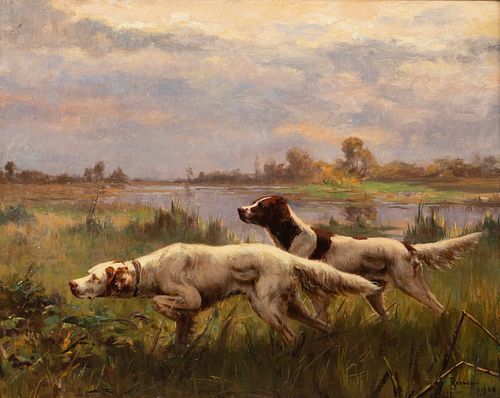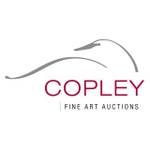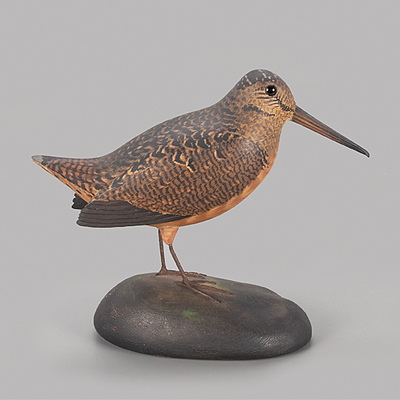Percival Rosseau (1859-1937), Point by the Pond
Lot 44
About Seller
Copley Fine Art Auctions
20 Winter Street
Pembroke, MA 02359
United States
Founded in 2005, Copley Fine Art Auctions is a boutique auction house specializing in antique decoys and American, sporting, and wildlife paintings. Over the course of the last two decades, the firm has set auction records for not only individual decoy makers, but also entire carving regions. Copley...Read more
Estimate:
$18,000 - $24,000
Absentee vs Live bid
Two ways to bid:
- Leave a max absentee bid and the platform will bid on your behalf up to your maximum bid during the live auction.
- Bid live during the auction and your bids will be submitted real-time to the auctioneer.
Bid Increments
| Price | Bid Increment |
|---|---|
| $0 | $50 |
| $1,000 | $100 |
| $2,500 | $250 |
| $5,000 | $500 |
| $10,000 | $1,000 |
| $25,000 | $2,500 |
| $50,000 | $5,000 |
About Auction
By Copley Fine Art Auctions
Jul 14, 2022
Set Reminder
2022-07-14 10:00:00
2022-07-14 10:00:00
America/New_York
Bidsquare
Bidsquare : The Sporting Sale 2022, Day 1
https://www.bidsquare.com/auctions/copley/the-sporting-sale-2022-day-1-9460
Lots 1-332 Copley Fine Art Auctions cinnie@copleyart.com
Lots 1-332 Copley Fine Art Auctions cinnie@copleyart.com
- Lot Description
Percival Rosseau (1859-1937)
Point by the Pond, 1908
signed and dated "Rosseau 1908" lower right
oil on canvas, 13 by 16 in.
Percival Rosseau was born near Baton Rouge, Louisiana, in 1859. Although considered a premier painter of sporting dogs, he did not pick up a paintbrush until the age of thirty-five. After leaving an eclectic business career, including stints as a cowboy and a lumberjack, he sailed to Paris to attend the Académie Julian. His entry at the 1904 Paris Salon, a painting of a pair of Irish wolfhounds, gained him pivotal acclaim. He returned to the United States where he found a ready market for his work among wealthy sportsmen and received many commissions from first-rate breeders of pointers and setters. Rosseau’s best works capture the tense action of hunting dogs and depict them in romantic landscapes.
Among these patrons was Percy Rockefeller, nephew of oil tycoon John. D. Rockefeller and a successful businessman in his own right. Along with several investors, Rockefeller built Overhills, a private hunt and country club with stables and kennels in Cumberland County, North Carolina. He kept a cottage on the property for Rosseau to use when he traveled to the state, and the artist painted there throughout the 1920s and 1930s.
Dog historian A. F. Hochwalt writes, “Eventually such men as Samuel G. Allen, Harry D. Kirkover and others who own high class shooting dogs began to cultivate his acquaintance, for artists who can portray the pointer and the setter, as he really appears in the field, those who are able to transfer to canvas an actual hunting scene where the dog is not a mere caricature, are few and far between the world over, but particularly so here in America."
Rosseau’s debt to the Barbizon tradition is apparent in “Point by the Pond" with its softly defined brushstrokes, rich colors, and pastoral setting.
Provenance: Private Collection, New YorkPlease email condition report requests to leah@copleyart.com. Any condition statement given is a courtesy to customers, Copley will not be held responsible for any errors or omissions. The absence of a condition statement does not imply that the lot is in perfect condition.Condition
- Shipping Info
-
Shipping info
Copley does not offer in-house packing or shipping. For clients who require shipping, please complete the Shipping Release Form and return it with your payment. The form includes a list of shippers we frequently work with.
-
- Buyer's Premium



 EUR
EUR CAD
CAD AUD
AUD GBP
GBP MXN
MXN HKD
HKD CNY
CNY MYR
MYR SEK
SEK SGD
SGD CHF
CHF THB
THB













